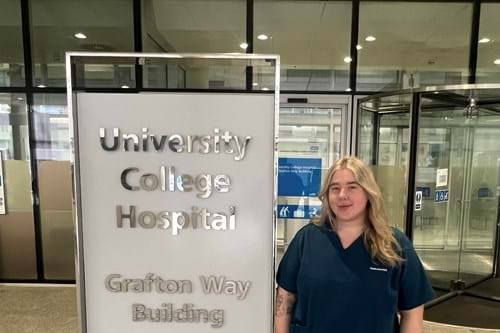
A therapeutic radiography graduate’s research dissertation abstract has been accepted by the European Society of Radiotherapy and Oncology for presentation at the 2024 congress.
Rebecca Spence enrolled in the BSc Radiography (Radiotherapy and Oncology) course at the Anglo-European College of Chiropractic (AECC) University College in 2020, before graduating last year.
This course helped get her research dissertation abstract accepted to the European Society of Radiotherapy and Oncology (ESTRO) 2024 congress, and to achieve her role as Therapeutic Radiographer in Proton Beam Therapy at University College London Hospitals (UCLH) NHS Foundation Trust.
Raising awareness
Ms Spence’s research focuses on awareness of risk factors around cancer amongst university students. Her submission will be displayed at the congress within the research section.
She said: “I wanted to raise awareness so that young people don’t engage in these risky behaviours, with the hope that more research is done on this topic in the future. I was shocked when it was accepted, as I don’t know of any other students that have submitted research to ESTRO. It has really inspired me to keep pursuing my interests and research.”
She added that since having her dissertation sample accepted, Ms Spence has been looking for more opportunities for research trials or papers at work.
While she will soon be moving to the radiotherapy department, she said she would “really like” to move toward a research-focused position.
Research in radiography
Ms Spence advised graduating students not to “hold back” because they have just qualified.
She said: “Put yourself out there for new learning opportunities and apply for any job that comes your way – take chances!”
Dr Andrew Williams, a now-retired senior lecturer in radiography at AECC and Ms Spence’s research supervisor, explained that therapeutic radiography research can range from “relatively straightforward” tasks, such as asking patients about their experience and checking how close a pathway follows guidelines, to complex ones like “informing the next big development in technology”.
He said: “In Rebecca’s case, the important thing is that any student or qualified radiographer at any level can get involved. Rebecca’s success in having her dissertation findings selected for presentation at the prestigious ESTRO congress is proof of that and the radiotherapy team at AECC UC are extremely proud of her achievements.”
ESTRO 2024
This year’s event takes place from 3-7 May 2024 in Glasgow, at the Scottish Event Campus Centre.
The event’s vision statement looking ahead to 2030 is “‘Radiation Oncology. Optimal Health for All, Together”, which emphasises ESTRO’s ambition to “further reinforce radiation oncology as core partner in multidisciplinary cancer care and to guarantee accessible and high-value radiation therapy for all cancer patients who need it”, according to the organisers.
To do so, the organisers said the Congress will “actively focus on translating science and evidence into practice”, that it will “support all radiotherapy professionals” with continuing professional development, and “increasingly embrace its role in policy”.
The deadline for late registration is 3 April. Find out more about how to attend here.
(Image: Rebecca Spence, via AECC UC)
